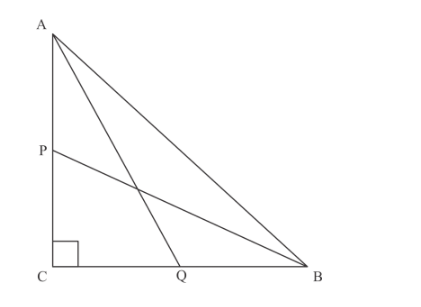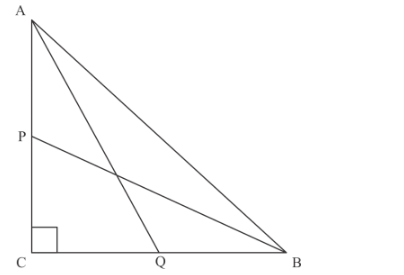In Figure 6, P and Q are the midpoints of the sides CA and CB respectively of ∆ABC right angled at C. Prove that 4(AQ2 + BP2) = 5 AB2.

In the given figure P and Q are the mid points of AC and BC, the we have to prove that ![]()
The following figure is given.

Using Pythagoras theorem in $\triangle A B C$, we get
AB2 = AC2 + BC2…… (1)
Similarly, by using Pythagoras theorem in $\triangle A C Q$ and $\triangle B C P$, we get
AQ2 = CQ2 + AC2…… (2)
BP2 = CP2 + BC2…… (3)
Now adding equation (2) and equation (3), we get
$A Q^{2}+B P^{2}=C Q^{2}+C P^{2}+A C^{2}+B C^{2}$
$A Q^{2}+B P^{2}=\left(\frac{B C}{2}\right)^{2}+\left(\frac{A C}{2}\right)^{2}+A B^{2}$ from equation (1)
$A Q^{2}+B P^{2}=\frac{A C^{2}+B C^{2}}{4}+A B^{2}$
$A Q^{2}+B P^{2}=\frac{A B^{2}}{4}+A B^{2}$
$A Q^{2}+B P^{2}=\frac{5 A B^{2}}{4}$..........(4)
Now multiply equation (4) by 4, we get
$4 \times\left(A Q^{2}+B P^{2}\right)=4 \times \frac{5 A B^{2}}{4}$
$4\left(A Q^{2}+B P^{2}\right)=5 A B^{2}$
Hence proved.
